Almost a year to the day since the release of FIFA 06, EA Sports has released that game's inevitable sequel, FIFA 07, for the PlayStation Portable. Last year's game represented a major improvement over its predecessor; so the question, of course, is whether or not the same can be said of this year's offering. For the most part, the answer is yes, but although FIFA 07 plays the same enjoyable, fast-paced soccer that its home-console counterparts do, the game counts a handful of bugs among its new features, one of which can occasionally shut down your PSP completely in the middle of a match when playing in manager mode.
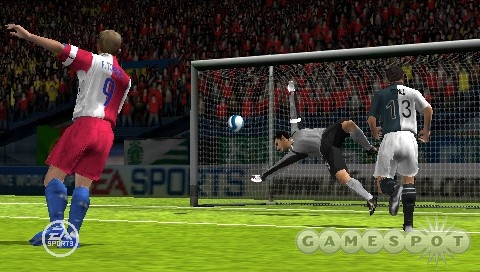
If you're familiar with FIFA 06, you'll find that FIFA 07 plays a quite different game of soccer to its predecessor, though initially it can be difficult to figure out exactly what has changed. One of the few obvious changes to this year's game is that players accelerate and decelerate more realistically, which means that they can't turn nearly as quickly when they're moving at speed. This results in your needing to pass the ball more, and depending on your play style, you might find that your trick modifier (left shoulder button) gets a lot more use than it did last year when you're attempting to beat opposing players in one-on-one situations. Both passing and using trick moves are a little more challenging in FIFA 07 than they were in 06, and because that's true for both teams (and because tackling when you're on defense is still relatively easy), the result is often that ball possession changes more frequently.
Trick moves have become more challenging not because they have a lower success rate, but simply because the controls for them are a little less forgiving. The section on trick moves in the mostly inadequate FIFA 07 instruction manual bears more than a passing resemblance to a special-moves list for a fighting game, and some of the star players even boast their own unique tricks. Passing the ball hasn't become more difficult per se; you just can't take it for granted as much because the accuracy of your passes is now dependant on the positioning of your player in relation to both the ball and his intended target. A pass to a player directly in front of you when you have the ball at your feet, for example, is more likely to succeed than a pass to a teammate who is barely in your players' field of vision, particularly if you're trying to make that pass on your first touch after receiving the ball at waist height. Lengthy strings of one-touch passes, then, are more difficult in FIFA 07 than in previous games, which adds a nice risk-versus-reward mechanic any time you attempt one rather than take a moment to get the ball under control.
Shots at goal are also greatly affected by the positioning and balance of your player, as well as by how well he has the ball under control. If you try to play the game just like FIFA 06, you'll watch a lot of your shots fly wide of the goal and into the crowd. This can be frustrating at times, but the flipside is that spectacular, almost unbelievable goals in the game are now the exception rather than the norm, which is certainly a good thing. That's not to say that scoring goals in FIFA 07 is difficult, though, because it isn't. Defenders generally back off attacking players a little too much, and the goalkeepers, although good at stopping shots for the most part, are a little too prone to spilling the ball when they do. Worse still, the goalkeepers will occasionally stand motionless while they watch a ball fly past them--we've even seen this happen with a headed back pass that could hardly have been better--the only part of the keeper that moved in the slow-motion replay of that particular own-goal was his head, as he turned to watch the ball narrowly miss his face and hit the back of the net. Worthy of note on the plus side is the new "finesse shot" feature that, using a modifier button that needs to be held down when taking a shot, lets you unleash shots that are more accurate but less powerful. It's not a feature that we've felt inclined to use a great deal, but if you've already beaten the defense and rounded the keeper it's a great way to avoid embarrassing open-goal misses.
Another way that you can avoid potentially embarrassing mistakes, though in a much more subtle way, is to keep your team's momentum up. Your momentum, as indicated by a performance meter in the top-left corner of the screen, is an indication of how well your players think the game is going, as determined not only by the current score but also by recent events on the pitch. It's entirely possible, then, for your team to be a couple of goals down but your players will still be playing their very best football or, by the same token, to be winning a game but struggling to contain their opponents. It's difficult to quantify just how much of an effect momentum has on your players' behavior, but it's definitely noticeable, and we've enjoyed numerous matches in which the run of play has shifted between the two teams several times.
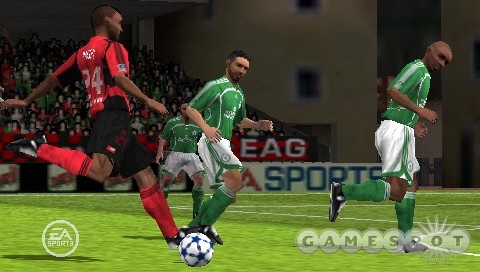
Matches like those, along with one-sided goalfests, are perhaps the ones that best show off one of FIFA 07's most consistently good features--in-game sound. The commentary from ITV's Clive Tyldesley and Sky Sports' Andy Gray isn't nearly as repetitive as it has been in previous years, and although it's not always entirely accurate, it's certainly delivered well. Complementing the commentary team's efforts perfectly is the noise from the crowd, which changes dramatically according to what's happening on the field and which of the teams is playing at home. The commentary and crowd chants on the PSP aren't as varied as those in the home-console versions of FIFA 07, but they're impressive nonetheless, and they really contribute to the feeling that you're playing in an important match.
As was the case in FIFA 06, the players on your team other than the one that you're controlling are adept at making off-the-ball runs and such. You'll often need to trigger offensive runs manually, which is achieved simply by tapping the left shoulder button, and the subsequent pass or through ball invariably feels more satisfying as a result. CPU-controlled players are less proactive on defense than they are on offense, unfortunately, which is especially noticeable when they continue to back away from attackers well into the penalty area. You shouldn't be relying too much on any defender that you're not controlling yourself anyway, and the good news is that when you switch players on defense, you'll usually be given a defender with a chance of intervening rather than one who's chasing back from a forward position, even if the latter is closer.
If the defender in question happens to intervene with a sliding tackle, you'll probably notice that the ball physics in FIFA 07 are even better than those in FIFA 06. Perhaps for the first time in a FIFA game, the ball feels like it's an object reacting to external forces rather than one with physics that are fudged for certain player animations. The game's believable physics are best demonstrated when the ball does something out of the ordinary, such as fly high up into the air after a fierce tackle or cross the goal line at a sharp trajectory after striking the underside of the crossbar. These oddities happen in real-life matches from time to time, and it's great that the same can now be said of the FIFA series.
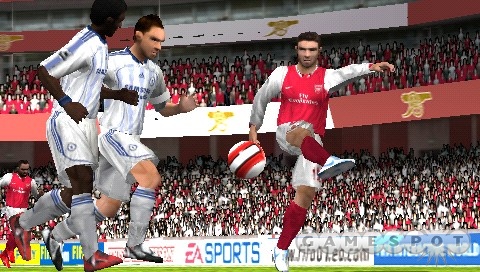
One of the great knock-on effects of FIFA 07's improved ball physics is that you're unlikely to find yourself scoring the same goal over and over again. There are certainly a few sweet spots from which beating the keeper is relatively easy, but on the whole you'll find that the goals you score are more varied and more satisfying than those in previous iterations of FIFA. More satisfying still, of course, are the goals scored against human opponents rather than against the occasionally predictable CPU when you take advantage of FIFA 07's ad hoc or infrastructure head-to-head play.
Whether playing FIFA 07 online or wirelessly with a friend, you'll find that the game plays quite differently to matches against the CPU, not only because most human opponents are tougher to beat, but also because lag is invariably a factor. In local ad hoc games, the lag is definitely something that you can get used to, since it's really just a slight delay between you pressing a button and then seeing your player react to it on the field. In online games, on the other hand, the lag is generally much more pronounced and is certainly less predictable. Most of the online matches that we played started out relatively lag-free, but as the games progressed, the lag became increasingly problematic and frequently stalled the action for a few seconds at a time. Furthermore, we were disconnected from more matches than we were able to finish, and while it's conceivable that our opponents were quitting out of games prematurely, it seems unlikely given that many of them weren't losing at the time.
When playing online, your choices are limited to playing a ranked or unranked game since there are no league or tournament options available, and certainly nothing resembling the interactive leagues mode that was introduced to other versions of FIFA 07 this year. Finding opponents using the well-presented lobby system is easy provided there are other players online, and the game's chat system lets you use a number of useful phrases as well as the PSP's own text-entry system to communicate with each other. Regardless of the fact that you'll be competing against players from all over the world, don't expect to be playing against many of FIFA 07's 500-plus licensed teams because, based on our experiences at least, almost everyone is playing as England, Brazil, Chelsea, Manchester United, Barcelona, or another of the game's most highly rated sides.
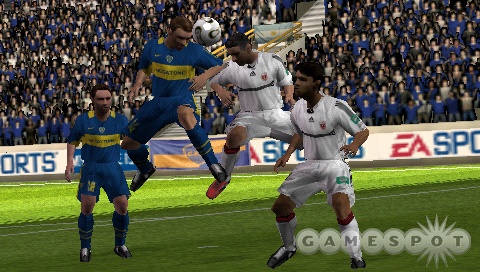
FIFA 07's only other noteworthy multiplayer feature is an ad hoc head-to-head version of the ball-juggling minigame that debuted in last year's game. If you're familiar with last year's juggling game, you'll have no problem picking this one up, since the rhythm-game-style mechanic of tapping the directional pad in the directions indicated on the screen is unchanged. The difference when playing this game competitively, though, is that every time you successfully juggle the ball, you'll fill a meter on the left-hand side of the screen, and when that meter is full, you'll earn a "trick" that can be used to give you some kind of advantage over your opponent. The tricks that become available to you vary according to both your player choice and how many times you fill the trick meter before choosing to use it. Examples of the tricks, some of which are much more effective than others, include slow-motion balls, giving your opponent a smaller target area within which to hit the arrow when the ball passes through it, and making your opponent's arrows spin around or point in completely the wrong direction. These trick attacks are initially every bit as confusing as they sound, but after spending some time with the game, you'll figure at least most of them out.
When you're not playing FIFA 07 with friends or online, you'll likely be putting your management skills to the test in the game's manager mode. The manager mode lets you assume control of any club in the game and then tasks you with leading them to glory while making decisions that can affect your club both on and off the field. After accepting a job at a team, your first duty will be to select a sponsor for the season. These sponsors won't replace the real ones on your uniforms when you play, but they're an important source of income, and you'll find that the sponsors offering you the most money are invariably the ones that will be the most difficult to please.
Next up will be an e-mail from your club's board of directors detailing their expectations for the season. Predictably, clubs that are currently enjoying a lot of success in real life expect it to continue, so choosing to manage a top-flight team can be more challenging than opting for one that's accustomed to midtable obscurity or relegation battles. The expectations are a little more varied in FIFA 07 than they were in FIFA 06, so in addition to achieving certain league and cup positions, you might find yourself tasked with improving club finances, reducing player salary bills, or extending the contracts of certain players. The board will also let you know which players are the fans' favorites, hoping that you'll find room for them in your starting 11 as a result.
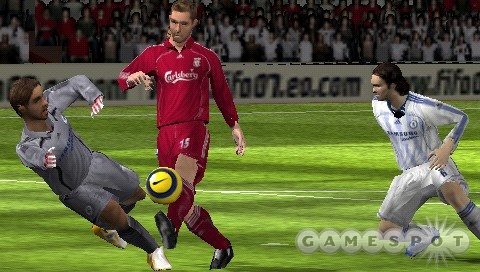
As in last year's game, your three main considerations in manager mode are keeping the fans happy, maintaining job security by keeping the board happy, and having good team chemistry. One of the new features for this year's manager mode is the player growth system, which lets you pluck upcoming players from your youth squad and then, by playing them alongside the first team, encouraging them to develop. Every player in your squad will gain experience points at the end of a match based on his performance, and you'll notice that the number of points awarded to young players is generally much higher than the number given to experienced pros. The flipside is that to nurture a star for the future, you have to spend multiple seasons fielding a player who isn't really good enough to be playing alongside the rest of your team.
FIFA 07's manager mode is almost identical to that on the PlayStation 2, which isn't surprising given that it's possible to transfer save games between the two versions. What is surprising, though, is that the PSP game boasts a couple of training options that aren't found in any other version of FIFA 07. The first is the aforementioned juggling minigame, and the second is an all-new minigame titled Wall Attack, in which you'll be tasked with kicking balls at a wall that looks like something out of Arkanoid--aiming for power-ups and avoiding bricks with red cards on them as you do so. Wall Attack is a lot of fun, and it's great that both of FIFA 07's minigames can be practiced at any time from the main menu.
The other significant new feature in manager mode is the "visual sim" option for matches. If for some reason you don't want to play a match yourself (we're not sure why that would ever be the case, frankly), the visual sim option lets you watch play-by-play commentary of the match and intervene with tactical decisions or by jumping in and assuming control at any time. The text-based commentary and match statistics that you have access to while in visual sim mode are adequate rather than impressive, and we can't help but wonder why there's no option to watch the game being played out using the regular, great-looking match engine. Fact is, the management portion of FIFA 07 works well in between matches, but it's not nearly deep enough to play purely as a management sim, which makes the option to "quick sim" games and get a result instantly even more redundant than the aforementioned one. With that said, FIFA 07 is prone to crashing midmatch from time to time when in manager mode, so not playing the games yourself might be a good way to avoid this problem. Yes, that's sarcasm--sorry, but we're still coming to terms with the fact that FIFA 07 crashed on us just moments before our Bolton Wanderers side claimed a scintillating 4-3 win over Chelsea.

Regardless of the fact that the management in FIFA 07 isn't particularly deep (though it can be very engaging), to play the game without actually playing the matches yourself would be to miss out on some of the best soccer visuals that we've seen in a PSP game to date. The players in FIFA 07 are recognizable for the most part, but it's their animation that really stands out as a huge improvement over last year's game. In FIFA 06, the player animation was difficult to fault, but in FIFA 07, it's even harder--you'll see players controlling the ball with different parts of their bodies, you'll see them losing their balance and falling over occasionally, and you'll certainly notice them bumping into rather than clipping through each other when areas of the field get busy.
FIFA 07, then, is a game that undoubtedly improves upon FIFA 06 in a number of ways, though it also has a few quirks of its own. FIFA 07 isn't hard to recommend is you have any interest in soccer, but consider yourself warned that the online play is unstable and that you should save your manager mode career after every match in case the game decides to crash the next time your team takes to the field. This is a good game that would undoubtedly have been great if it were finished.